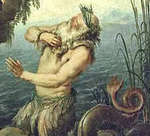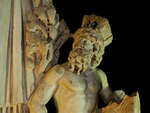
Nereus
Nereus, also known as "the old man of the sea", was the son of Pontus and Gaea, and father of the water nymphs Nereids and Nerites. One of the Nereids was Thetis, who was the mother of the famous hero Achilles. He was considered to be a gentle and trustworthy god, who never lied. Gradually, Nereus was replaced by another sea god, Triton.
Nereus Q&A
Link/Cite Nereus Page
Written by: The Editors of GreekMythology.com. GreekMythology.com editors write, review and revise subject areas in which they have extensive knowledge based on their working experience or advanced studies.
For MLA style citation use: GreekMythology.com, The Editors of Website. "Nereus". GreekMythology.com Website, 24 Jan. 2015, https://www.greekmythology.com/Myths/Figures/Nereus/nereus.html. Accessed 26 April 2024.


